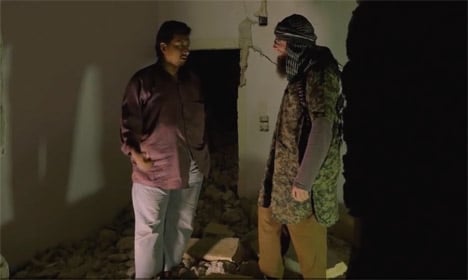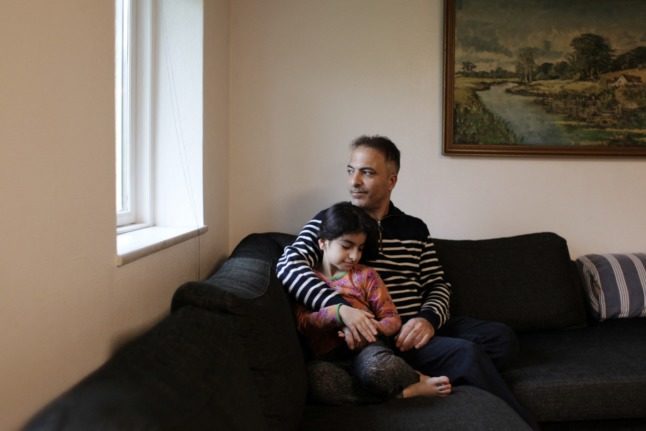AL QAEDA
Norway journo gets under the skin of Al-Qaeda fighters
One is a devout and cheery Saudi, the other a British convert overcome by doubt, the third a Syrian fascinated by the promise of 72 virgins: a new documentary unveils the shadowy world of Syria's would-be suicide bombers.
Published: 24 February 2016 09:18 CET

A screenshot from 'Dugma, the Button'. Photo: Paul Refsdal/Journeyman Pictures/YouTube
In a rare, in-depth look at the Al-Nusra Front, Al-Qaeda's affiliate in Syria, the 58-minute documentary 'Dugma, the Button' reveals the convictions and doubts of those ready to become martyrs — “the precision weaponry of the poor,” in the words of the filmmaker, Norwegian journalist Pal Refsdal.
The film follows the three future suicide bombers as they wait for their missions, without any commentary. See an extended trailer here:
“When I get close to the target, I'll pull the safety switch, the first one… and I'll keep driving until I'm a few metres away from the target, and then I'll pull the other safety switch,” says Abu Qaswara, sitting at the wheel of a lorry loaded with explosives, covered in makeshift armour so it looks like something out of road movie 'Mad Max'.
“This is the button. This is Dugma. I'll press it… and with Allah's permission I'll send them all to hell,” he says with a disconcerting smile.
Aged 32 when the documentary was shot and father of a little girl he's never seen, the Saudi national arrived in Syria two years earlier. He's on “the list” of volunteers ready to blow themselves up to take out a Syrian army position.
The wait is usually a long one, between one and two years, according to Refsdal who spent more than six weeks with the men at the end of 2014 and in mid-2015 in northwestern Syria.
The Al-Nusra Front is parsimonious with its use of suicide bombers, according to Refsdal.
“Several weeks can go by in between two operations,” he told AFP in an interview in Oslo.
“They're not like IS [the Islamic State group, which they are also fighting which sends car bombs one after the other with very young drivers dying en masse,” he added.
While waiting for a target to be selected — always strictly military, according to Refsdal — the candidates for martyrdom go about the daily routines that are part of a messy and never-ending war. At the risk of being overcome by doubt.
'Relaxed' kamikazes
Born Catholic to a British mother and an American father who worked in Hollywood — Patrick Kinney worked on 'Braveheart', 'Indiana Jones' and 'Rambo II' — Lucas Kinney, who goes by the name Abu Basir al-Britani (“the Briton”), sees his convictions falter after his young wife gets pregnant.
“Now I can't do that to my family,” he admits, his voice cracking with emotion.
There are also moments of levity and humour, such as when the Syrian, who goes by the pseudonym “Abu Ljaman”, asks where the speedometer is on the armoured vehicle that Abu Qaswara is teaching him to drive.
“You're on your way to martyrdom. Are you really going to worry about speeding?,” the Saudi asks him incredulously.
Abu Ljaman also gets gently chided when he makes a second reference to the 72 virgins promised in the afterlife.
“I was surprised by the ease of relations with them, by their relaxed side,” said Refsdal, who converted to Islam while being held by Afghanistan's Taliban in 2009.
“If I hadn't known they were Al-Qaeda, I would never have guessed based on my gut feeling alone,” he said.
But does his documentary, filmed after the Al-Nusra Front gave him free access, not risk giving a grandstand to members of what many countries consider to be a “terrorist” organisation?
“I understand that there may be people who disagree with it in principle and argue that Al-Qaeda attacked New York in 2001, Madrid in 2004, London in 2005, Paris and Charlie Hebdo,” he said.
“But the film isn't trying to tell people what to think, it's just depicting their daily lives and then it's up to people to think what they want after having seen it,” he added.
The Norwegian intelligence service PST had no problem with his time spent with the suicide bombers.
“What's illegal is to support and participate in the Al-Nusra Front or IS,” PST spokesman Martin Bernsen told AFP.
“Making a documentary about them can not be considered as providing support or participation,” he said.
Sold to at least four television channels, “Dugma, the Button” will air on Norwegian television in early March.
Url copied to clipboard!


 Please whitelist us to continue reading.
Please whitelist us to continue reading.